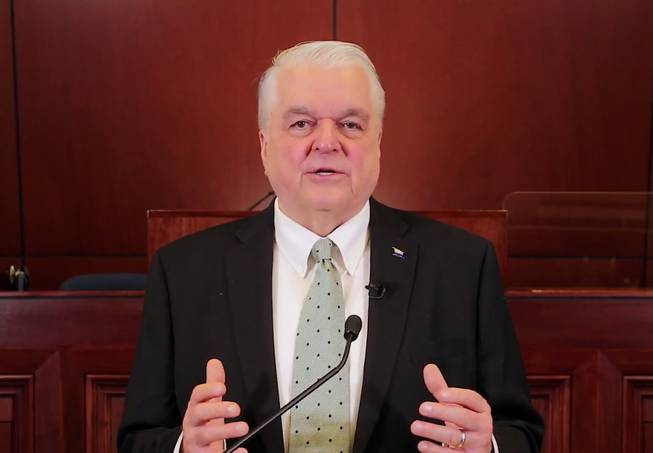
screenshot from live video
Nevada Governor Steve Sisolak delivers his State of the State address Tuesday, Jan. 19, 2021.
Tuesday, Jan. 19, 2021 | 7 p.m.
Gov. Steve Sisolak outlined plans Tuesday to spur job growth and attract new industries to Nevada as the coronavirus pandemic continues to wreak havoc on the state’s tourism-driven economy.
In his prerecorded State of the State address, the first-term Democrat proposed investing heavily in job training, infrastructure and renewable energy to stimulate Nevada's economy both during and after the pandemic. He described the virus as “challenging,” “excruciating” and “unprecedented” for families and businesses and conceded that the struggle was far from over.
"It’s not enough to just aim for a full reopening of our current economy,” Sisolak said. “We must look forward to the kind of economy that will let our state prosper in the future and create opportunity for all Nevadans."
Economic diversification was a theme throughout the speech. The state’s reliance on the hospitality industry is one of the main reasons why it was so heavily impacted by the pandemic.
Sisolak announced four priorities: vaccinating Nevadans, getting students back into the classroom, revitalizing the economy, and looking at ways to “spur growth,” including green energy jobs and infrastructure investments.
Early on in the speech, Sisolak called for $50 million more to be allocated by the Legislature to the Pandemic Emergency Technical Support program, a state program that provides up to $10,000 in grants to small businesses. The state has already given out $50 million from the program.
He also announced Lt. Gov. Kate Marshall will head a Small Business Advocacy Center, which he said will help small businesses “cut through the red tape” and access resources to help them weather the pandemic.
Sisolak also stated he would work with the Legislature to pass an energy bill establishing a commitment to “increased transmission, storage, and distribution of all forms of clean energy,” which he said would create “good-paying construction jobs” starting this year and attract new industries to the state.
The governor proposed the creation of “Innovation Zones,” campuses designed to allow startups, research and new technology to flourish. He did not include details about the legislation for that proposal, but said it would not involve taxpayer-funding or tax breaks, such as the roughly $1.25 billion in rebates that Gov. Brian Sandoval’s administration offered to lure Tesla to Northern Nevada.
Sisolak said one firm, Blockchains LLC, has committed to invest in Nevada once the legislation passes and would “create a small city in Northern Nevada that would fully run on blockchain technology,” bringing high-paying jobs and tax revenue with it.
Blockchain is a digital ledger that records transactions of cybercurrencies, such as Bitcoin.
To ready Nevada’s workforce, Sisolak says he will create a program called Nevada Job Force in which companies would fund, design and run job training programs. With many workers expected to continue working from home post-pandemic, he also wants to establish a resource center connecting Nevadans with remote-work jobs around the world and in emerging industries.
“Many of the jobs lost during the pandemic will not come back as businesses move toward automation,” Sisolak said. “Job training — and retraining our displaced workforce — as well as connecting Nevada workers with remote working opportunities and emerging industries will be key to the state’s economic future.”
The governor is also calling on the Legislature to work with the Nevada System of Higher Education to transfer control of community colleges to a new “independent authority.”
“Community colleges, together with union apprenticeship programs, are critical elements in building Nevada’s workforce and economic future,” Sisolak said.
The governor also acknowledged the state’s badly hampered and backlogged unemployment insurance system, which left those out of work waiting months for relief. Sisolak said the backlog has been reduced by 95% but the Department of Employment, Training & Rehabilitation needs a better system, including updated computers, which he’ll ask lawmakers to tackle.
"While public employees at every level of government worked around the clock to deal with the impact of the pandemic, we found that many of our government systems were out-of-date and overwhelmed. We need to fix them,” Sisolak said.
He stressed there's light at the end of the tunnel.
“Nevadans are battle born,” Sisolak said. “We face our challenges head on. And we will get through this difficult time together, because the State of our State is determined, resilient and strong.”
The Associated Press contributed to this report.
